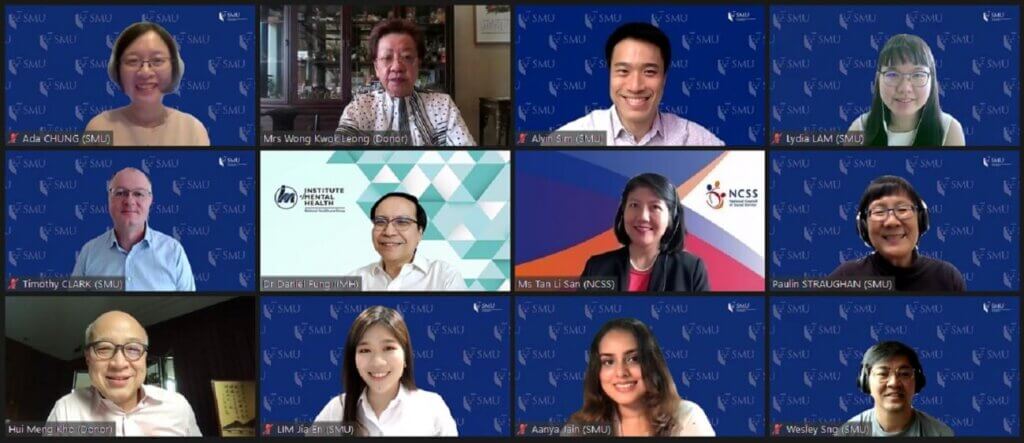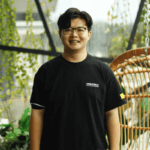By the SMU Digital Marketing Team
University life can be challenging for some students who face a combination of academic and financial pressures, as well as issues in adjusting to tertiary life in a new institution. During a pandemic, opportunities to build resilience through social interactions have been significantly restricted, which can result in some students experiencing higher levels of psychological distress. As such, mental health has come into the spotlight around the world, not least in global universities.
SMU has always prioritised its students’ mental well-being and proactively supports them in achieving positive mental health. This enables its students to maintain a sense of equilibrium and self-belief, which in turn allows them to remain purposeful, engaged and confident to meet learning challenges and cope amply with setbacks in life. Building such resilience ensures that students are able to bounce back from difficult circumstances and make better choices towards a more fulfilling life.
On 18 October 2021, as part of its annual Mental Health Awareness Week, the University launched its new Resilience Framework for students — a holistic platform to raise mental health literacy levels and support efforts to safeguard students’ mental well-being. It aims to develop resilience in six inter-related dimensions of wellness using a three-pronged approach: education and shaping attitudes; encouragement by providing professional and peer support through various platforms; and experiences by broadening students’ emotional and psychological horizons through authentic learning environments.

Speakers and panellists at the virtual launch of the SMU Resilience Framework on 18 October 2021
Here is a handy guide on how the SMU Resilience Framework provides valuable coping techniques that can see SMU students through not just their university years, but also well into their careers.
Build resilience, holistically
Remote learning does not have to be restricted to the acquisition of academic knowledge; it could also apply to the strengthening of mental well-being. To this end, SMU has launched a curated module to educate staff and students and help them understand the importance of mental wellness. Titled “Mental Health and You”, it imparts practical strategies to incoming freshmen for looking after their own mental well-being, as well as advice on when and how to seek help, and understand how they can help loved ones or friends with some of the more common mental health conditions
To further strengthen the Education pillar of the SMU Resilience Framework, the University has developed a suite of online learning modules to equip students with relevant knowledge and skills for mental health resilience, delving into topics from stress management and effective time management, to virtual work skills. These resources will be consolidated within a new microsite, which will serve as a one-stop portal for all resources and programmes that fall under the Framework. Besides a wide range of online resources, regular workshops are also conducted by SMU’s various offices to help students take stock and check how they are coping physically, mentally and emotionally. For example, the Thrive Workshop Series offers personal development opportunities and equips students with practical life skills. Examples of topics covered include managing personal finance, and what to do “when life throws you lemons”.
In addition, the SMU Pathfinders Workshop Series comprises curated experiential workshops, focusing on developing values driven learners, authentic collaborators and responsible global citizens. The series has recently explored areas including ways to grow a leadership mindset and nurture various life skills. Moreover, the Mrs Wong Kwok Leong Student Wellness Centre has conducted a workshop series offering wellness tips to enhance personal and relationship effectiveness; while the Dato’ Kho Hui Meng Career Centre, as part of its Finishing Touch programme, offers a range of workshops that covers soft skills training, and guides students towards building their professional and personal brand as future job seekers.
A friendly peer
It’s no secret that there is a strong positive correlation between social support and mental health: A social support network provides “advantages for people faced with stressful physical and psychosocial events” and is considered a factor that can significantly reduce the psychological distress of people facing stressful events. While students naturally form a circle of confidants and friends in school, the onset of Covid-19 and transition to remote learning arrangement have reduced opportunities to make new acquaintances and engage with university mates.
Enter SMU Peer Helpers: A group of full-time undergraduate students selected and trained to support the work of professional counsellors at the Mrs Wong Kwok Leong Student Wellness Centre. While they are not professional counsellors, they extend the reach of the Wellness Centre by providing a listening ear and emotional support to their peers in times of need, underscoring the importance of the Encouragement aspect of the Framework.
Through weekly training sessions held by counsellors and other mental health professionals, Peer Helpers pick up crucial skills such as employing empathy, suicide intervention, and mental health first aid — and even role play situations to put the learnings into practice.
Put in practice
Covid-19 has had a significant impact on our lives, and Community Service projects were not exempt from the restrictions and guidelines, which affected the feasibility and survivability of many projects. However, while some projects were shuttered, others were born from the opportunities presented by the crisis.
Community Service has been an integral part of SMU’s DNA since the university’s inception in 2000, and now reinforces the Experiences pillar of the Framework, by empowering student leaders and participants to become more resilient in the course of working alongside peers, external stakeholders and the community.
For example, SMU Rotaract Club, a youth development club that emphasises service over self, rolled out a project that engaged with migrant workers during the pandemic. Named Project Yokefellow, 40 student volunteers went online every Friday to interact with migrant workers who were undergoing quarantine. While the group faced multiple challenges in implementing the project, they developed a sense of perseverance as they overcame the hurdles, and eventually succeeded with interacting with the community through online games and quizzes, and by offering a listening ear to alleviate any stress which the workers might have been experiencing. Following the pilot run, the students hope to further expand their activities and to provide regular support for these workers.
Through the SMU Mental Resilience Framework, SMU aspires to develop resilience in its students so that they are empowered to take charge of their own wellbeing and support the wellbeing of others, even after leaving university. Visit Mrs Wong Kwok Leong Student Wellness Centre to learn more about the resources available.









